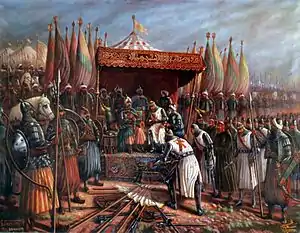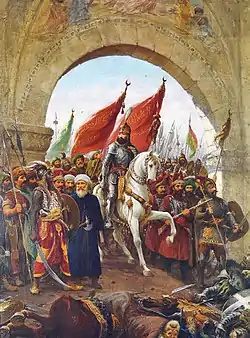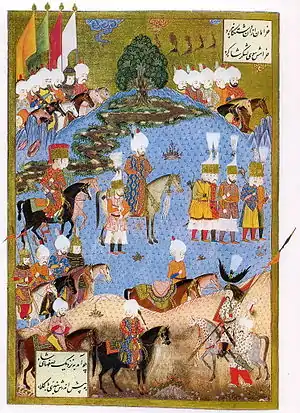List of Muslim military leaders
Entries in this chronological list of Muslim military leaders are accompanied by dates of birth and death, branch of Islam, country of birth, field of study, campaigns fought and a short biographical description. The list includes notable conquerors, generals and admirals from early Islamic history to the 21st century.
Muslim military leaders
- Ali ibn Abi Talib, one of the earliest followers and the beloved cousin and son-in-law of Muhammad. Known as " The Lion of Allah". He participated in most of the battles during the lifetime of Muhammad. He was the forth caliph of the Rashidun caliphate.
- Umar ibn Khattab, Umar, also spelled Omar, was one of the most powerful and influential Muslim caliphs in history. He was a senior companion of the Islamic prophet Muhammad. He was the second caliph of Islam.
- Khalid ibn al-Walid (585–642): Also known as "The Sword of God", he participated in several dozen battles during the conquest of the Arabian Peninsula, the Ridda Wars, and Islamic conquests of Persia and Syria, including the Yamamah, Firaz, and Yarmouk.[1]
- Saʿd ibn Abī Waqqās (595-674): A commander involved in leading the Muslim conquest of Persia.
- Hasan ibn Ali The son of Ali-ibn-Abu Talib, was the 2 Imam of Islam was truly loved by Muhammad. Hassan was poisoned to death. His dead body was shot by arrows until he bled. Hasan was known for donating to the poor, his kindness to the poor and bondmen, and for his knowledge, tolerance and bravery. Hassan is buried in a cemetery called Janat ul Baqi in Madina.
- Hamza ibn Abdul-Muttalib c.566–625: Also known as "Lion of God", Muhammad gave him the title Sayyid-ush-Shuhda ("Chief of the Martyrs").
- Husayn ibn Ali 8 January 626–10 October 680: He was the son of Ali Ibni Talib and a grandson of Muhammad, who refused to pledge allegiance to Yazid. On 10 October 680 (Muharram 10, 61 AH), he and a small group including his family members of followers fought a large army. Husayn and all of his men were beheaded at the Battle of Karbala, he fought chivalrously and bravely, against almost 4,000-30,000 Umayyad soldier. He participated in his fathers' battles such as Nahrawan and Siffin and Battle of the Camel etc.. He was known for his patience, kindness, and generosity. He is buried in Karbala where more than 17,000,000 people go to pay respects at his grave during Muharram.
- Abbas ibn Ali
- 'Amr ibn al-'As (592–664) day: Known as a shrewd politician and general, he is most noted for leading the Muslim conquest of Egypt in 640.
- Uqba bin Nafe: He led a Muslim army in northern Africa.
- Musa bin Nusair 640–716: An Umayyad governor and general in North Africa.
- Al-Hajjaj bin Yousef 661–714: An Umayyad administrator of Iraq.
- Al-Muthanna ibn Haritha was a Muslim Arab general in the army of the Rashidun Caliphate.
- Al-Qaqa ibn Amr al-Tamimi was an Arab general in the army of the Rashidun Caliphate.
- Mukhtar al-Thaqafi c.622– March 687: Born in al-Ṭaʾif, now in Saudi Arabia, he was an early Shia Islamic revolutionary based in Kufa, Iraq, who led an abortive rebellion against the Umayyad Caliphs in vengeance for the death of Husayn ibn 'Ali at the Battle of Karbala.
- Nusaybah Bint Ka'ab was the first Muslim woman warrior, fought various battles, protected prophet Muhammad during Battle of Uhud.
8th century
- Tariq ibn-Ziyad d.720: An Moroccan Amazigh (Berber) general who converted to Islam after the Arab conquest, he later led the Muslim army which conquered Hispania.
- Abdul Rahman Al Ghafiqi: A Spanish Umayyad general born in Yemen who fought Charles Martel twice in France in the battles of Tours and Narbonne, and was defeated in both engagements.
- Abd-ar-Rahman bin Muawiyah ad-Dakhil (731-788): Founder of the Umayyad rule in Spain, he escaped from the Abbasids in Damascus and through North Africa reached Iberia, where he used the regional dissension against Yusuf al-Fihri to his advantage and defeated him, taking control of the entire peninsula.
- Zaid ibn Ali: An Arab who fought the Banu Umayyad.
- Muhammad bin Qasim: 695–715: An early Arab General who captured Sind and Multan and parts of Punjab in Pakistan.
- Isma'il ibn Jafar: An Arab who fought the Banu Umayyad.
- Marwan II Last Umayyad Caliph and a military leader
- Qutaibah bin Muslim: An Arab Muslim general who captured Transoxiana.
- Abu Muslim, the Persian Abbasid general who toppled the Umayyad dynasty
- As-Saffah Abbasid Caliph, founder of Abbasid Dynasty and a military leader.
- Al-Mansur Abbasid Caliph and a powerful military leader.
- Al-Mahdi Abbasid Caliph and a powerful military leader.
9th century
- Harun al-Rashid the famous Abbasid Caliph and the great Muslim military leader.
- Al-Amin Abbasid Caliph and a military leader.
- Al-Ma'mun Abbasid Caliph and a military leader.
- Al-Abbas ibn al-Ma'mun Famous Abbasid Prince and a military leader.
- Al-Mu'tasim Abbasid Caliph and the powerful military leader.
- Al-Muwaffaq Abbasid Prince and a talented military leader, brother of Caliph Al-Mu'tamid.
- Al-Mu'tadid Abbasid Caliph and a powerful military leader (892-902).
- Tahir ibn Husayn d.822: A soldier of the Abbasid Empire.
10th century
- Mahmud of Ghazni 971–1030: Ruler of Ghazni.Conquered the temple of Somnath.
- Abd al-Rahman III 8th Umayyad Emir of Córdoba.
- Jawhar as-Siqilli: A commander of Fatimid forces, he founded Cairo and built Al-Azhar Mosque.
11th century
- Alp Arslan
- Tughril Beg: founder of the Seljuq Dynasty.
- Yusuf ibn Tashfin: founder of the Almoravid Dynasty in the Islamic West, he secured several decisive military victories against the Christians in Al-Andalus and was able to reunify it under his rule after a period of internal fragmentation known as Muluk Al-Tawaif.
12th century

Saladin and Guy of Lusignan after Battle of Hattin
- Muhammad of Ghor
- Nur ad-Din Zangi 1118–1174: A Syrian ruler and military leader who fought in the Crusades.
- Ṣalaḥ ad-Dīn Yusuf bin Ayyub 1137-1193: He unified Egypt, Syria, and Palestine under his rule, led the Muslims to victory at the Battle of Hattin and was able to reclaim several cities from the Crusaders, especially Jerusalem.
- Saif ad-Din Ghazi I: A leader during the crusades.
- Al-Muqtafi Abbasid Caliph of Baghdad and a military leader.
- Al-Nasir Abbasid Caliph and a military leader.
13th century
- Qutb-ud-din Aybak: He built the Qutub Minar.
- Az-Zahir Abbasid Caliph and a military leader.
Jalal ad-Din Mingburnu Defeated the mongols in the battle of parwan and the father of Qutuz
- Al-Nasir Abbasid Caliph and a military leader.
- Shams ud-Din Iltutmish: He conquered Multan and Bengal from contesting rulers, and Ranthambhore and Siwalik from their rulers.
- Shah Jalal: Known to have propagated Islam into north-eastern Bengal after a long history of travel between the Middle East, Persia, Central Asia and South Asia.
- Razia Sultana: Turkish princess who ruled the Delhi Sultanate in modern-day India.
- Mu'in ad-Din Unur
- Al-Kamil: A Sunni Kurd leader.
- Baibars: The fourth Sultan of Egypt in the Mamluk Bahri dynasty, he fought Crusaders and Mongols.
- Saif ad-Din Qutuz: fought Crusaders and Mongols.
- Qalawun: fought Crusaders.
- Khalil
- Ghiyas ud din Balban
- Ala ud din Khilji: An Indian king who fought the Mongols.
- Osman Ghazi I: The founder of the Ottoman Dynasty.
- Berke Khan: A ruler of the Golden Horde
- Aybak: The founder of the Mamluk Dynasty.
- Ertuğrul: Father of Osman I and leader of the Kayi tribe who was in service of the Seljuk Sultanate of Rum.
- Ala ad-Din Kay Qubadh I The ruler of the Seljuk Sultanate of Rum who fought the Byzantines.
14th century
- Bayezid I: The victor at the Battle of Nicopolis
- Zheng He 1371–1433: A Chinese mariner, explorer and admiral who was born into a Muslim family but embraced a broader ranging religious faith later.

Sultan Mehmed II's entry into Constantinople
15th century
- Hayreddin Barbarossa 1475–1546: Ottoman Admiral
- Zahiruddin Babur: Conqueror of India and founder of the powerful Mughal Empire.
- Shah Ismail I of Persia: the founder of the Safavid dynasty of Iran, ruling from 1501 to 23 May 1524 as shah (king).
- Selim I: Also known as "Yavuz Sultan Selim", he was the sultan of the Ottoman Empire and Ottoman Caliph.
- Mehmed II: Also known as "Mehmed the Conqueror", he captured the Byzantine stronghold of Constantinople.
- Sharifa Fatima: A female Zaidi chieftain of Yemen, she conquered Sa'dah.
16th century

Suleiman with army
- Chand Bibi
- Dragut: also known as "The Drawn Sword of Islam", Ottoman Naval Commander, Beylerbey, and famed Corsair
- Humayun: Second Mughal emperor.
- Isa Khan Niazi: Commander of Sher Shah Suri.
- Malik Ambar: An Ethiopian slave who became a general and challenged the might of the Mughal army.
- Sayyed Mahmud Khan: A Commander–in– Chief of the Mughal Empire.
- Sher Shah Suri: Founder the short-lived Sur Dynasty.
- Suleiman the Magnificent: also known as "Kanuni Sultan Süleyman", he was a sultan of the Ottoman Empire and Ottoman Caliph.
- Tahmasp I: He ensured the survival of the Saffavids of Persia.
- Abbas I of Persia: was the 5th Safavid Shah (king) of Iran and is generally considered the strongest ruler of the Safavid dynasty.
17th century
- Aurangzeb: Also known as Aurangzeb Alamgir, he was the 6th Mughal Emperor who expanded the Mughal Empire to its largest extent.
- Murad IV: Rejuvenated the Ottoman Empire with reforms and reconquered the city of Yerevan and Baghdad.
- Zulfiqar Khan Nusrat Jung: Son of a renowned nobleman of Emperor Aurangzeb. He held several appointments under Emperor Aurangzeb in the Mughal Empire.
- Daud Khan Panni: He was a Mughal commander, Nawab of the Carnatic and later Viceroy of Deccan. The Emperor Aurangzeb appointed him as a leading commander of the Mughal Army in 1701, while Zulfikhar Ali Khan was the Nawab.
18th century
- Nadir Shah 1688–1747: Also known as Nadir Qoli Beg and Tahmasp-Qoli Khan, he was Shah of Iran and a military leader.
- Ahmad Shah Durrani 1722–1772: He was the founder of the Durrani dynasty and is regarded as the founder of the modern state of Afghanistan. He is best known for his victory against the Maratha at the Battle of Panipat (1761).
- Hyder Ali 1722–1782
- Imam Shamil 1797–1871: An Avar (from modern-day Dagestan) who is considered both a political and religious leader for Chechens, Dagestanis, and Caucasians.
- Tipu Sultan 1750–1799): Also known as the Tiger of Mysore, he was the ruler of the Kingdom of Mysore. He fought against the British Empire and was defeated and martyred at Seringapatam on 4 May 1799.
19th century
- Ahmadullah Shah 1787–1858: Led Indian rebel warriors in the Siege and Capture of Lucknow.
- Syed Ahmad Barelvi or Sayyid Ahmad Shaheed 1786–1831: was an Indian Sunni Muslim revivalist from Rae Bareli, a part of the historical United Provinces of Agra and Oudh. The epithet Barelvi is derived from Rae Bareli, his place of origin.
- Barkat Ahmad: Leading figure in the Indian Rebellion of 1857. Commander in chief of Battle of Chinhat where he led 6000 rebels and attacked the British residency in Lucknow.
- Diponegoro 1785–1855: Javanese prince who opposed the Dutch colonial rule during the Java War of 1825–1830.
- Fazl-e-Haq Khairabadi 1797–1861: Leading figure in the Indian Rebellion of 1857.
- Abd al-Qādir al-Jazā'irī 1808–1883: An Algerian militant against the French occupation.
- Mir Masjidi Khan d.1841: An Afghan resistance leader during the First Anglo-Afghan War.
- Bakht Khan: Indian Muslim commander during the Indian Rebellion of 1857.
- Husein Gradaščević: Leader of the Great Bosnian uprising.
- Muhammad Ahmad 1844–1885: A Muslim religious leader and militant in Anglo-Egyptian Sudan.
- Omar Mukhtar 1858–1931: A Libyan leader of the resistance against the Italian occupation in Libya.
- Muhammad Ibn 'Abd al-Karim al-Khattabi 1882–1963: A Moroccan Berber leader, he fought against the French and Spanish occupations of Northern Morocco.
- Begum Hazrat Mahal: An Indian Queen who fought for independence from the British.
- Ma Zhan'ao 1830–1886: A general of the Qing dynasty.
- Ma Anliang 1855–1920: A general of the Qing dynasty and then of the republic.
- Ma Guoliang: A general of the Qing dynasty.
- Ma Qianling 1824–1909: A general of the Qing dynasty.
- Ma Zhanshan 1885–1950: A general of the Republic of China.
- Ghazi Osman Pasha 1832–1900: An Ottoman field marshal and the hero of the Siege of Plevna.
- Fakhri Pasha 1868–1948: Commander of the Ottoman Empire army and governor of Medina from 1916 to 1919.
- Ibrahim Pasha of Egypt 1789–1848: Commander of the Egyptian army who defeated the Ottoman Empire army several times.
20th century
- Ahmad Shah Massoud: 1953–2001 (aged 48): A powerful guerrilla commander during the resistance against the Soviet occupation between 1979 and 1989 in Afghanistan.
- Mustafa Kemal Atatürk: 1881-1938 (aged 57): Founder of the Republic of Turkey who defeated the British and French forces in the Battle of Gallipoli and later in the Turkish War of Independence. Mustafa Kemal was the only Turkish commander who never suffered a defeat during the First World War.
- Muhammad Ali Jinnah :(1987-1948) Founder of Islamic Repulic Of Pakistan (Pakistan came into being on ideology of Islam on 1947).
See also
- Rules of war in Islam
- Jihad
References
- Akram, Agha Ibrahim (2004), The Sword of Allah: Khalid bin al-Waleed – His Life and Campaigns, Oxford University Press, ISBN 0-19-597714-9, p. 93
This article is issued from Wikipedia. The text is licensed under Creative Commons - Attribution - Sharealike. Additional terms may apply for the media files.